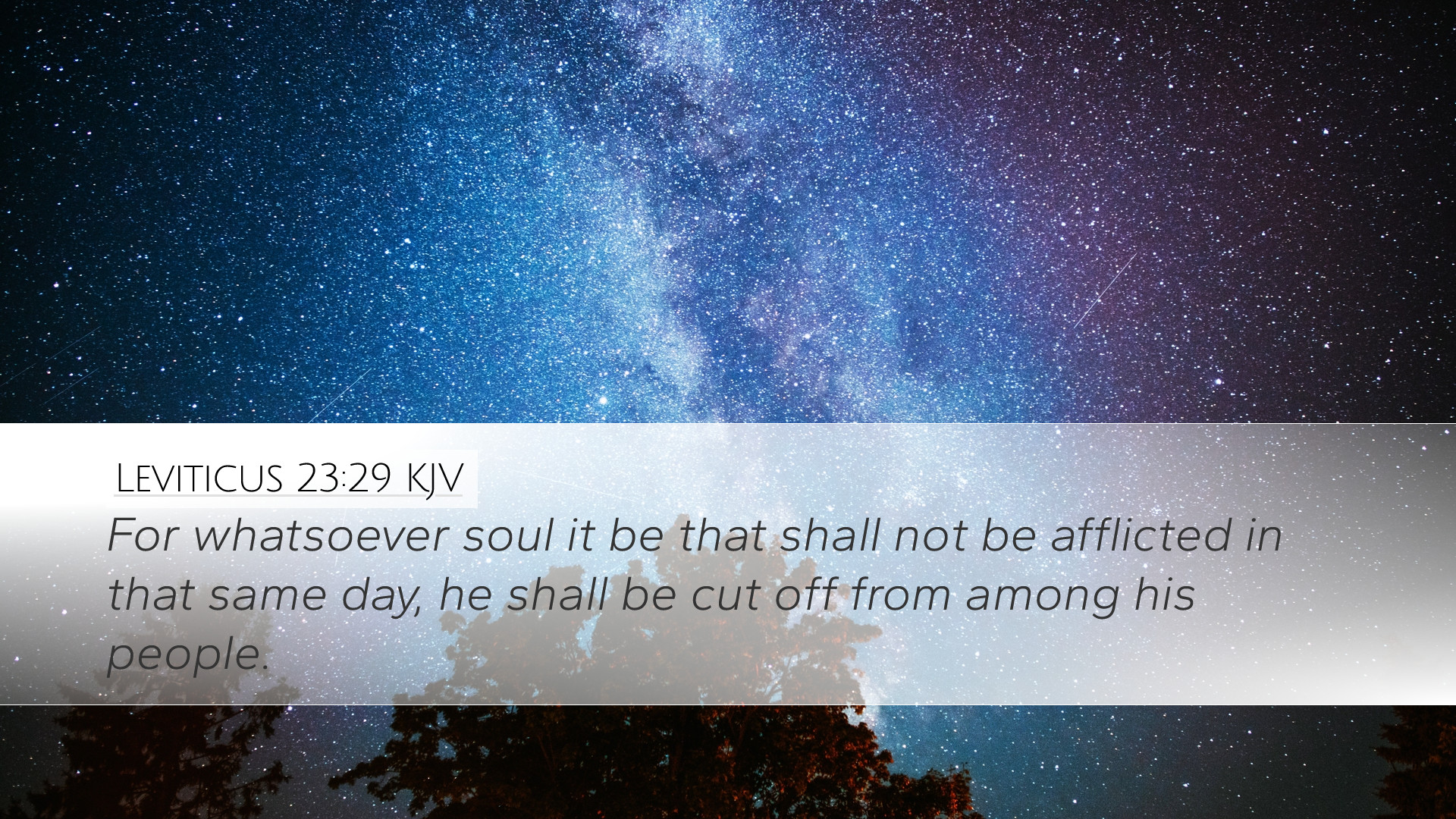Commentary on Leviticus 23:29
Verse Text: "For any person who is not afflicted in soul on that same day shall be cut off from his people." (Leviticus 23:29, ESV)
Introduction
This verse is part of the instructions concerning the Day of Atonement, a profoundly significant occasion in the Jewish calendar described in Leviticus 23. It highlights the importance of a humble and repentant heart before the Lord. The divine sanction for this observance underscores the connection between personal disposition and communal identity in the specifications of ancient Israelite worship.
Significance of Affliction
To understand the implications of "afflicting the soul," we must delve into the spiritual and communal essence of this term. Commentators such as Matthew Henry highlight that the affliction referred to is not merely physical but signifies a deep, spiritual contrition. This reflects heartfelt repentance which is fundamental to approaching God.
- Spiritual Preparedness: This affliction indicates the necessity of preparing one’s heart to encounter God’s holiness. It acknowledges human frailty and sinfulness.
- Corporate Identity: The wording suggests a collective responsibility among the Israelites; neglecting to afflict one's soul affects the entire community.
Contextual Understanding
The context of Leviticus is crucial for understanding this command. Leviticus 23 provides the festivals and holy days designed to set Israel apart for God (as discussed in Albert Barnes’ Commentary). Each season of worship is tied to the nation’s identity and relationship with God, reinforcing the significance of adhering strictly to these divine decrees.
Day of Atonement
Particularly, the Day of Atonement, or Yom Kippur, was a day of solemnity where the people were called to both individual and collective repentance. Adam Clarke states that this day represented a pivotal moment to reset one's relationship with God, ensuring that they were in a state of grace and favor. Thus, failure to heed the call to afflict one’s soul was seen as a serious transgression.
Consequences of Neglect
The verse explicitly states the grave consequence of being "cut off from [one’s] people." This phrase carries a weighty implication. Matthew Henry suggests this phrase symbolizes not just exclusion from the community but from the covenant promises of God as well. The people of Israel viewed themselves as a chosen people, and to be cut off meant one was estranged from their identity.
- Excommunication: This suggests a form of excommunication that separates the unrepentant from the blessings of the covenant community.
- Spiritual Death: Furthermore, this cutting off can be likened to a spiritual death, indicating that true life is found in communion with God.
Spiritual Lessons for Today
For modern-day readers, this admonition is a call to introspection and serious self-evaluation. The spiritual practices of mourning sin and humbling oneself before God remain pertinent for the church. Albert Barnes notes that repentance is a continuous process for believers, not merely an act performed during designated seasons or holidays.
Repentance and Restoration
Engaging in genuine repentance opens the door to restoration with God. The solemnity of afflicting one’s soul reflects a deeper understanding of God's holiness and grace. As emphasized by Adam Clarke, moments of introspection lead to healing and renewal.
Conclusion
In summary, Leviticus 23:29 serves as a powerful reminder of the necessity for a humble response to God’s holiness. The connection between personal practice of humility and the communal experience of grace is vital. As believers, recognizing our dependence on God’s mercy through acts of repentance allows us to maintain our covenant relationship with Him, thereby fulfilling our roles within the community of faith.
This verse resonates deeply through generations, reminding us of the seriousness of our relationship with God and the communal implications of our faith. Let us heed the call to afflict our souls, ensuring we align with God's purposes for both individual and collective life.


